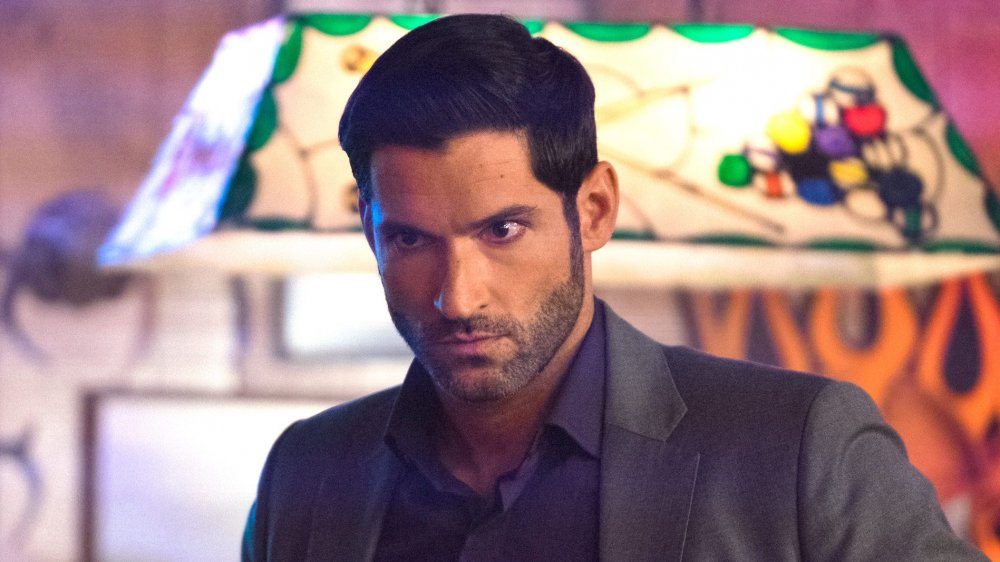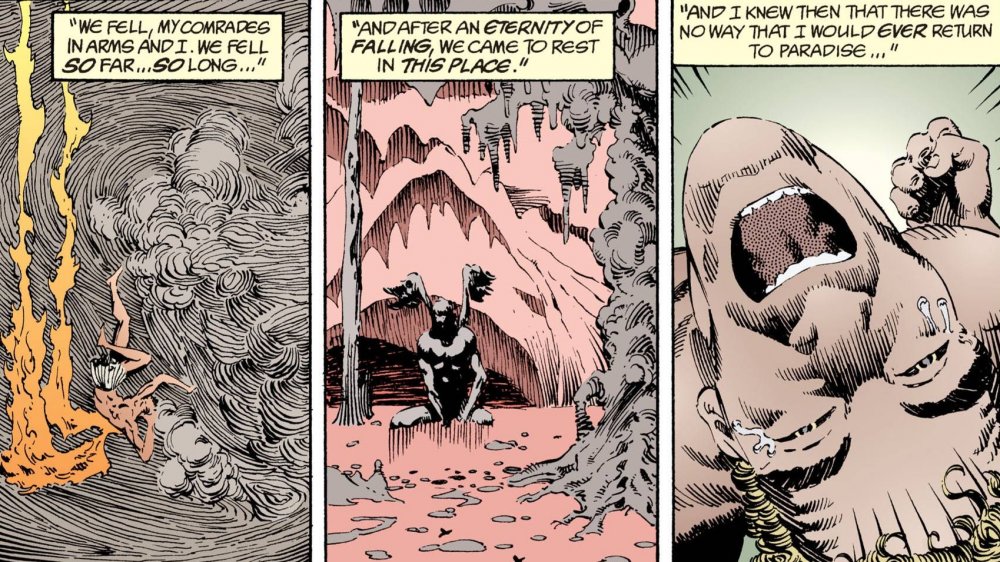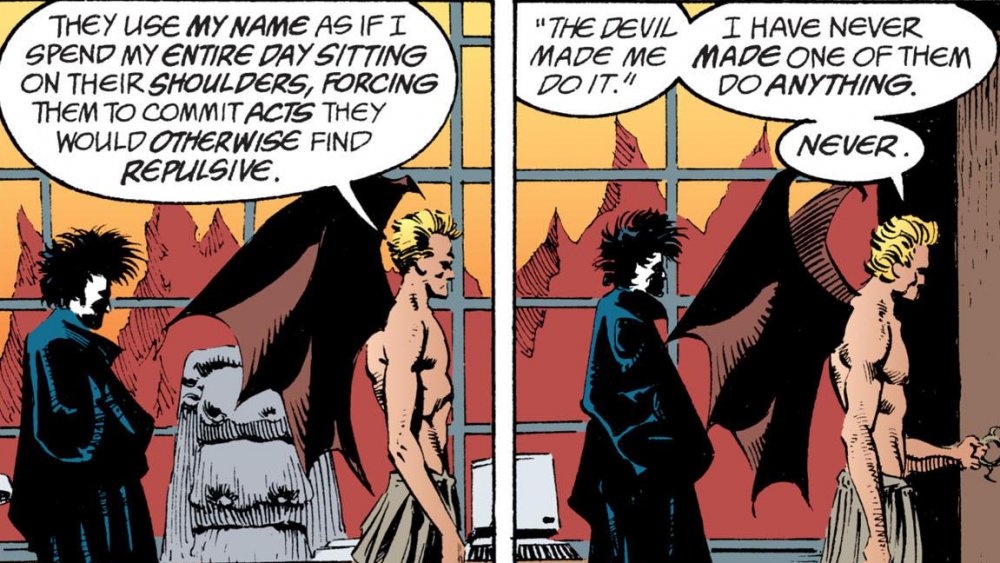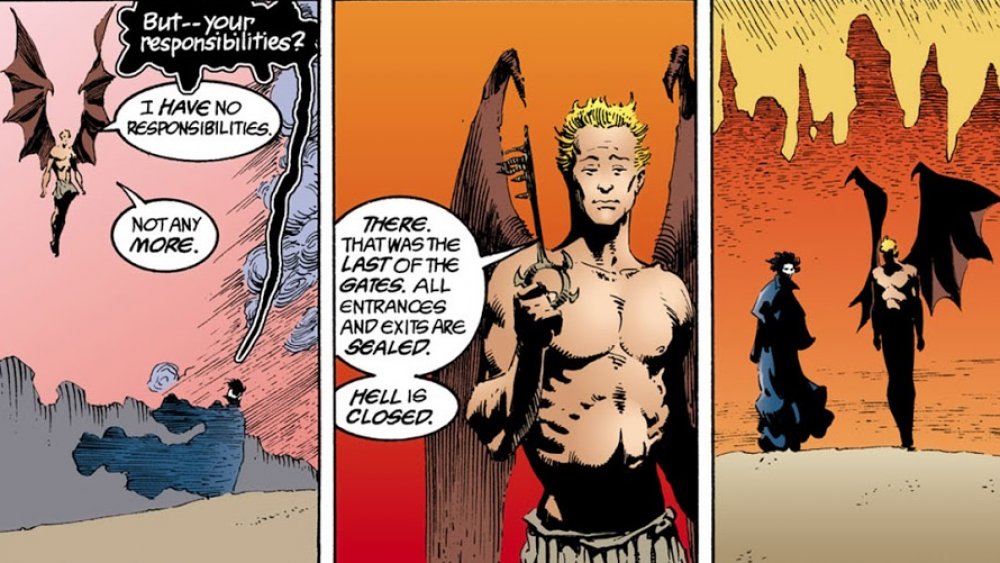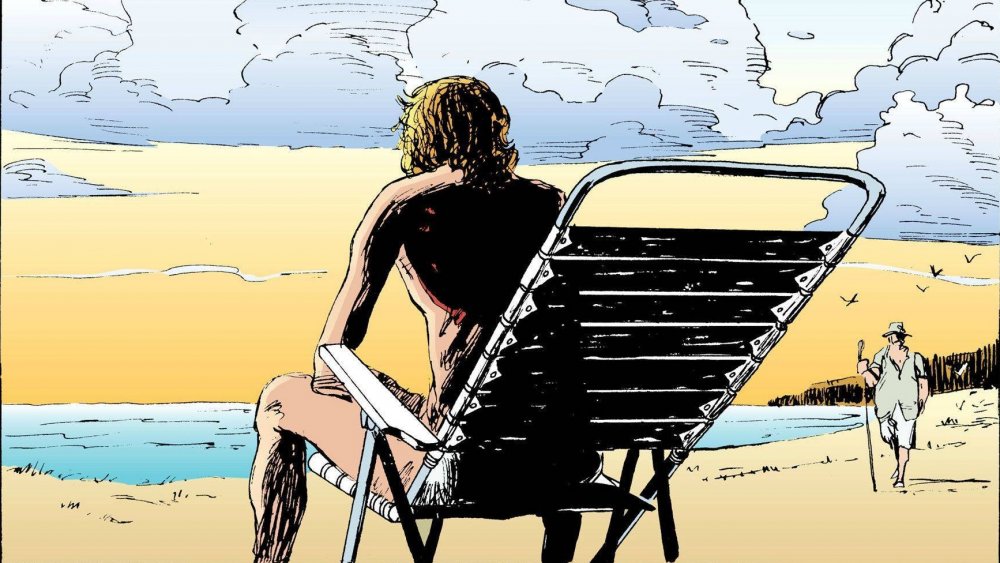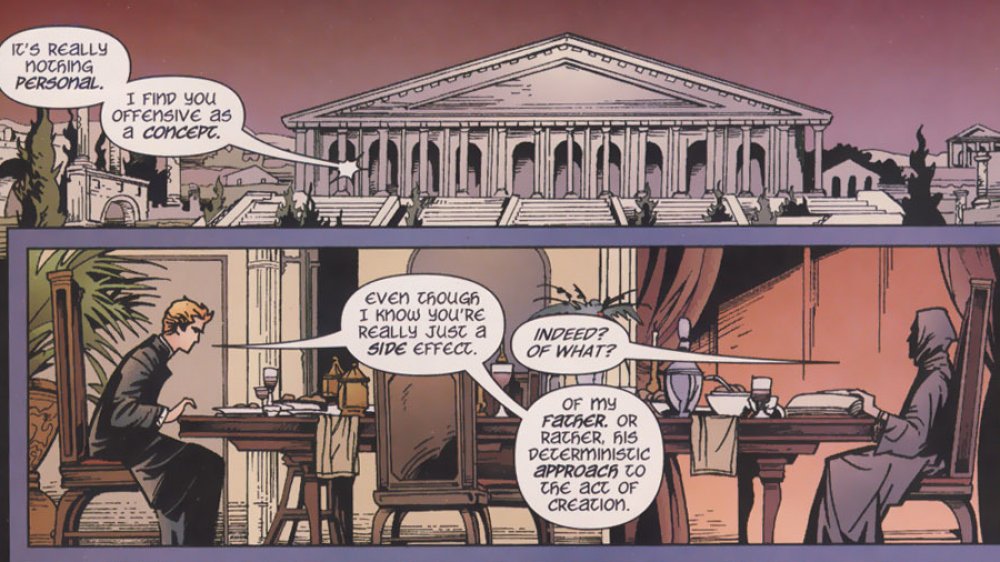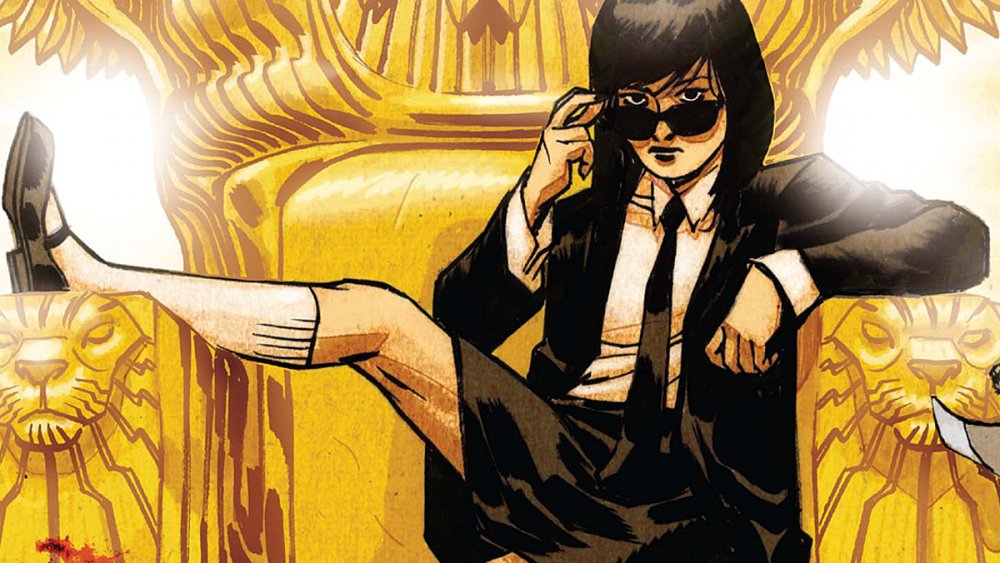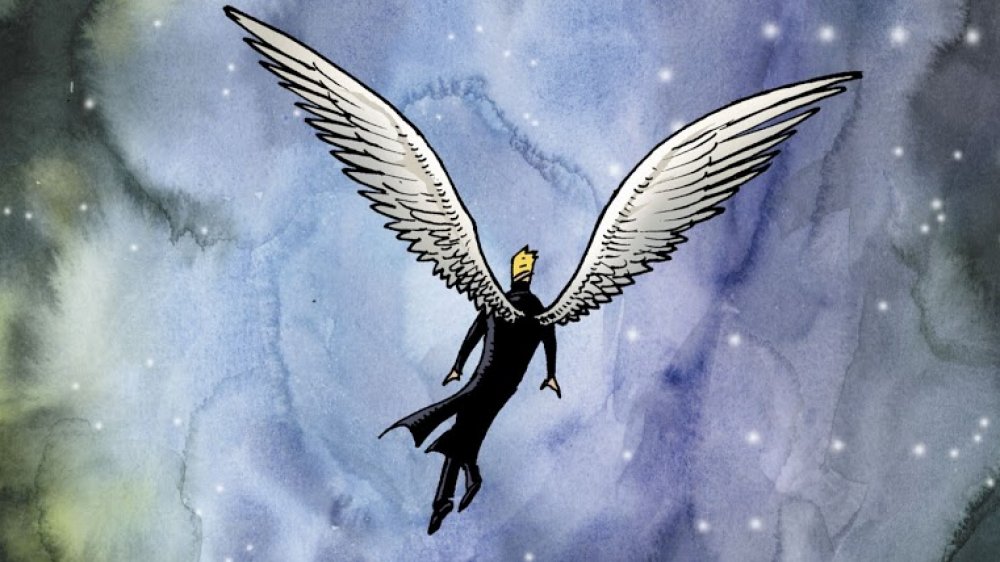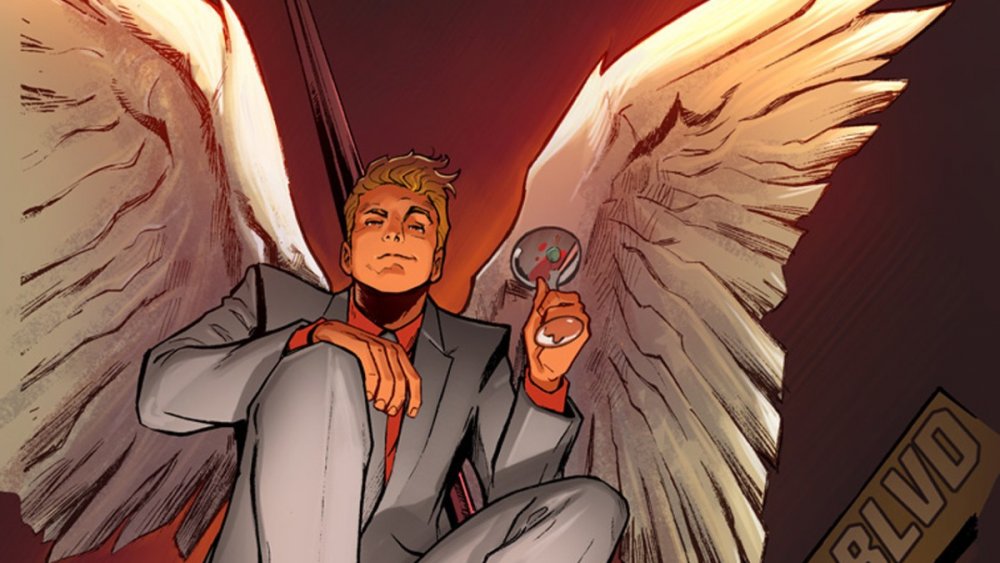Lucifer Morningstar's Entire Backstory Explained
Leave it to humans to be endlessly fascinated by Satan, the villain to end all villains. Writers and artists especially see something in the infernal figure's inability to live up to God's demands, and his inevitable turn against Him. This is a big part of why so much of what makes up Satan in the popular imagination comes from work created long after the Abrahamic holy books were put to the page. From John Milton's precedent-setting depiction of a fallen angel leading a host against Heaven in Paradise Lost to today's takes on shows like Lucifer, we keep building up our own mythology of the Devil on the stage, screen, page, and beyond.
Myth-obsessed writer Neil Gaiman took this history of Satan-centric fiction and ran with it in his legendary Sandman series. Lucifer's appearances in that comic were so popular, he got his very own comic series, and eventually his own TV show. But as omnipresent as this figure is, there's still a lot you might not know about the Prince of Darkness, currently played by Tom Ellis on Lucifer. Come dive into darkness with us as we explore the past, present, and future of the fallen angel.
The Sandman and Paradise Lost
Sandman maps out a whole cosmos for Dream, its brooding protagonist, to travel. As one of the Endless — immortal anthropomorphic embodiments of concepts like destruction and desire — Dream moves through the world of myths and gods as easily as our own mortal plane. At some point, he ends up in Hell, where readers first encounter Lucifer, ruling over his realm of eternal torment.
Sandman's take on Lucifer pulls heavily from John Milton's Paradise Lost. The first major character introduced in the epic poem, Lucifer is a fallen angel who rebelled against God, deciding that he would rather "reign in Hell than serve in Heaven." Milton's work follows a defeated Satan's plan to corrupt mankind in another attempt to get one over on God. Sandman borrows the charisma and tragedy of this take, but moves away from any direct relation to man. This Lucifer Morningstar is concerned with himself and his nemesis above all else. He does fairly little in regard to corrupting the souls of humanity. At some point, a damned human points out that his title, "Lord of Lies," is a bit overblown, and that Lucifer doesn't take an active role in guiding people to Hell. "He doesn't lie at all," the man says. "He tells you the exact, literal truth. And he lets you find your own way to Hell."
Unhappy in Hell
The fact that Lucifer is known for underhandedness irritates him massively. As he rants to Dream, he has never made any human do anything, despite how often people claim otherwise. "They live their own tiny lives," he tells Dream with no small amount of frustration," I do not live their lives for them. And then they die, and they come here ... and expect us to fulfill their desire for pain and retribution."
All this hints at a larger problem: The ruler of all damnation is deeply unhappy about the way his eternal life has turned out. He has begun to view Hell as a stagnant place, completely out of line with his own radical ethos. As Mike Carey, writer of the stand-alone Lucifer comic series which spun-off Sandman, explained it, Lucifer is unable to stick to the comfortable and the routine. "We play safe. Most of us do, most of the time," he said," but Lucifer doesn't know the meaning of safe, and he never bothers to look down at the tramlines."
With that in mind, it's clear that Lucifer's time as ruler of Hell came with an expiration date.
Handing over the keys
When Dream journeys to Hell to retrieve a spurned lover, he discovers a nearly empty place. Lucifer meets him, explains that he has quit, and hands over the key to Hell. Dream doesn't hold the title of ruler of Hell for long, however: He turns Hell over to loyal angels in the service of God, who continue the practice of tormenting wayward souls. Rather than carrying out these punishments for the enjoyment of the demons who once filled Hell, however, these new angels view punishment as redemptive. While admonishing a bloodthirsty demon mid-torture, they say, "That was the old Hell. That was a place of mindless torture and purposeless pain. There will be no more wanton violence; no further suffering inflicted without reason or explanation. We will hurt you and we are not sorry ... because afterward you will be a better person." How does the tortured soul feel about this? "That makes it worse," he moans, "That makes it so much worse."
In the meantime, Lucifer sets up shop on the mortal plane. Hell might continue on, but his part in it is over.
Lucifer's life on Earth
Using his incredible powers of persuasion, Lucifer quickly becomes successful on Earth. He ends up settling down in Los Angeles, where he opens up a piano bar called Lux and runs it alongside Mazikeen, a demonic daughter of Lilith.
Though he's been freed from Hell after billions of years, Lucifer can't let go of his anger — specifically, his frustration surrounding the problem of free will. If, he feels, a predestined path exists for all creation, then all sin and missteps are part of that plan, making eternal punishment unjust. Indeed, if God built the universe to ride on rails, then Lucifer's own rebellion was planned by God. That makes his own expulsion and punishment a grave injustice, and troubles notions of sin and free will.
Eventually, it is revealed that Lucifer was not sent to Hell by an angry God. Rather, the space was a concession from the creator, allowing a rebellious angel to get as far from the light of Heaven as possible. Hell built itself around Lucifer's whims — God did not construct its many horrors. Though Lucifer knows this, he does not let on to his underlings. The lie of his banishment is the only one he allows himself to tell.
Unable to escape
The Lucifer comic series starts with the Devil happily retired. But he can't outrun the watchful eye of Heaven and its angels. Their continued intrusions into his life post-Hell eventually boil over, and he falls back into his old ways of attacking God and his loyalists. After again reaching a stalemate with Heaven, he decides to create his own bubble universe that will be outside of God's jurisdiction.
Because Lucifer creating a universe of his own and outrunning God would negate the creator's supposed omnipotence, the entire host of Heaven comes down to try and stop him. Lucifer and Mazikeen fight hard to create their space, with Lucifer continually turning up his nose at the entities who act as pillars of the current universe. He holds the most scorn for Destiny of the Endless: He sees Dream's brother as the embodiment of God's love of predestination. Lucifer makes it clear that his new universe will be based around the idea of free will — a figure like Destiny will have no place there.
Heading out
Ultimately, Lucifer is unsuccessful in his attempt to create a new universe. Realizing that he would have to return to creation, and thus God's rule, Lucifer throws himself out of the known universe entirely. As in the similarly cosmic Dark Tower series, the man who wants to leave the universe is pursued. God follows Lucifer, leaving his throne behind to chase down his errant son.
Lucifer's niece, a young girl named Elaine Belloc, assumes the throne of Heaven to keep the entirety of creation from falling apart. To keep things tidy, the world rewrites itself around the current inhabitants of creation, effectively making it as though the old God never existed. Hell is rebuilt around the remaining demons and the universe soldiers on. Meanwhile, Lucifer is in the void beyond creation, surrounded by all that is and never was. As he is engulfed in chaos, God approaches him, as any father might approach a wayward son.
One final rejection
God tries to comfort His most cantankerous creation, to no avail. He then offers to merge with Lucifer, becoming two new entities. God claims that He wants to close the gap between Lucifer and Himself, so that He might finally understand why Lucifer felt so compelled to rebel. "Each of us would be the hot metal to the other's mold," He says, creating something entirely unprecedented. Lucifer could be born again, no longer the fallen angel and adversary of the world.
Going along with God's plans is anathema to Lucifer, however. Though he'd managed to destroy God's predestined universe as it had existed, he can't imagine agreeing to any suggestion that God raises. "This face is mine. This scar — is mine," Lucifer tells his immortal father, "You may not have them. Not with my permission." Lucifer opts to throw himself into an endless void of nothing, rather than go along with God's plan. God tells him to go, and that He will not see him again. The series ends with Lucifer melting into the blank white page, beyond God's reach at last.
A real whodunnit
Lucifer returns from the void several years later to team up with an unlikely partner. The archangel Gabriel, who has spent eons battling the Prince of Hell as one of God's most favored servants, needs Lucifer's help to solve a murder mystery fit for Nietzche: God is dead, and they need to find who did it.
Gabriel has been cast out from Heaven and can only return once he's found the killer. A series of twists and turns carry the brothers across nearly all planes of existence. The sibling rivalry between Lucifer and Gabriel simmers in the background of this noirish story, which seems to straddle the tone of the three Lucifer properties: Sandman, the previous comic run, and the TV series. Ultimately, it's revealed that Gabriel killed God and had his memories of the event wiped. Though the archangel is somewhat horrified, it's obvious that years of living under God's rule have chafed, and his time spent with Lucifer has only further pushed him from the ramrod-straight morality of Heaven. He pokes at Lucifer, saying that he beat out his brother by being the one to finally go all the way. "I'm much worse than you ever were," he tells the Devil. "At least I've got that."
On-screen
The version of Lucifer Morningstar, and all of his powers, that fans see on TV cobbles together bits and pieces of all his former incarnations. Because it began as a network show on Fox, it came in the only language that gritty television seems to speak: police procedural. At the outset, Lucifer has abandoned Hell to build a nightclub in Los Angeles, much like Carey's series. But rather than being pulled back into the conflict between Heaven and Hell, TV's Lucifer is inadvertently brought into the fold of the LAPD.
Across five seasons, the Devil helps to solve crimes in modern Los Angeles, all while fending off the occasional cosmic menace or paranormal attack. Lucifer generated enough fans to circumvent its own cancellation, a real-world reflection of the main character's slippery and resilient nature. Fox axed the series after three seasons, but Netflix picked it up for two more amid fan outcry. Though the series was meant to close after its 75th episode, another unlikely renewal revived it. Talk about the devil's own luck.
